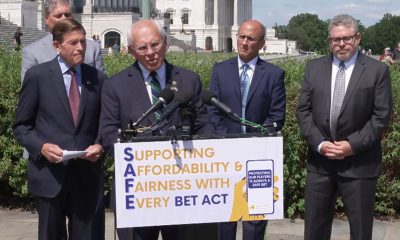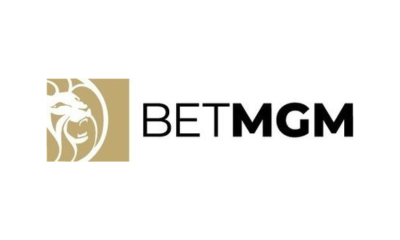Compliance Updates
Reg-tech – Easing the burden on compliance teams

Greg Ponesse, Chief Revenue Officer at Compliable
The year is coming to an end, and we can look back at an interesting 12 months that have seen the US betting and gaming landscape further expand into three new states, Vermont, North Carolina and Kentucky.
The American Gaming Association (AGA) recently released numbers that showed commercial gaming revenue was boosted in Q2 of 2023, hitting a record of $16.07bn. The impressive results marked the 10th consecutive quarter of growth for the industry.
Yet, some operators have had to navigate through choppy waters, with news stories from the last 18 months including Churchill Downs, MaximBet, PlayUp, Fubo, FOX Bet and WynnBet closing or pulling out of states as they struggle with profitability.
Sports betting, the main legalized vertical in the US, is such a low margin business that the ability to save money anywhere in operations is so important. Competition is extremely high, and the sports betting markets in the majority of legalized states have been dominated by a handful of behemoths such as DraftKings and FanDuel.
While these operators have large compliance teams to cope with the fragmented regulatory landscape that exists across states in the US, smaller to medium-sized companies have fewer resources to handle ever-changing regulations while also preparing for new states opening up.
Historically, if not handled by an internal team of compliance staff, regulatory issues were simply given to outside counsel with their associated high legal fees. Furthermore, overstressed smaller compliance teams leave room for mistakes as a result of human error which can lead to large regulatory fines.
The number of reg tech solutions now available in the gambling space can be hugely beneficial and can drive down costs in a number of ways, with one of the major advantages being that companies can benefit from compliance work that is being done in one market across similar jurisdictions.
Despite a lack of common regulatory approaches in legalized US states, there are still many similar obligations, and with technology, the process to complete these tasks can be automated. Licensing of employees and reporting of revenues or other data are common compliance duties that most regulators require. This type of requirement can easily be handled by technology rather than employees, significantly increasing efficiency, and freeing the team to focus on higher level problems which can be critically important when launching in new jurisdictions.
Simply put, reg tech allows a smaller team to operate with the same skills and efficiency as a much larger team and can help cut costs while still maintaining operational compliance.
Even if fewer US markets are currently opening up compared with a few years ago, successful gambling operators and suppliers are targeting multiple states at a minimum. We have passed the point where any one person can be an expert on every gambling jurisdiction’s requirements and tech is a necessary component to help manage the processes.
As 2024 is approaching, we will see further regulatory developments in the US betting and gaming space and more consolidation cannot be ruled out as operators grapple with being profitable in a hyper competitive sector.
Reg tech can play an important part, cutting costs while streamlining and simplifying processes and procedures, helping operators to succeed in the exciting US market.
Compliance Updates
574 Slot Machines, Bingo Halls and Online Betting Modules were Destroyed by Coljuegos

The Illegal Operations Control Department destroyed 574 gambling items that had been seized because they were operating without authorization in departments such as Cundinamarca, Atlántico, Valle del Cauca, among others, and which stopped transferring around $63.545 million to the health system.
“The destroyed items were valued at around $169 million and belonged to criminal structures that were dedicated to operating games of chance and luck without authorization and without paying the respective monopoly rents,” said Marco Emilio Hincapié, president of Coljuegos.
Among the destroyed items were electronic slot machines, bingo chairs, roulette wheels, poker tables, Keno and online betting modules, each of them composed of computers, CPUs, televisions, ticket machines, among others.
“In total, we have completed 7,934 destroyed items, valued at more than $1.5 billion. Due to these illegal activities, the health system has lost more than $200 billion in recent years, resources that would have allowed us to serve more Colombians under the subsidized regime,” said the president of the entity.
Hincapié also said that in the coming days, Coljuegos will continue destroying another 117 electronic slot machines, 350 bingo elements (chairs, tables and boards), 8 poker tables and 252 sports betting modules.
“Never before has an administration attacked illegality in the industry so strongly. We are doing this at the behest of our president Gustavo Petro, who has always asked us to fight corruption and to decisively strike the mafias that operate unauthorized games in various regions of the country,” said Hincapié.
It is worth mentioning that illegal gambling organizations in Colombia are failing to pay the State around $1.5 billion annually for exploitation rights, resources that could be allocated to the health of low-income citizens.
Compliance Updates
GAMING POLICY ADVISORY COMMITTEE – NOTIFICATION OF SEATS WITH TERMS EXPIRING DECEMBER 31, 2024
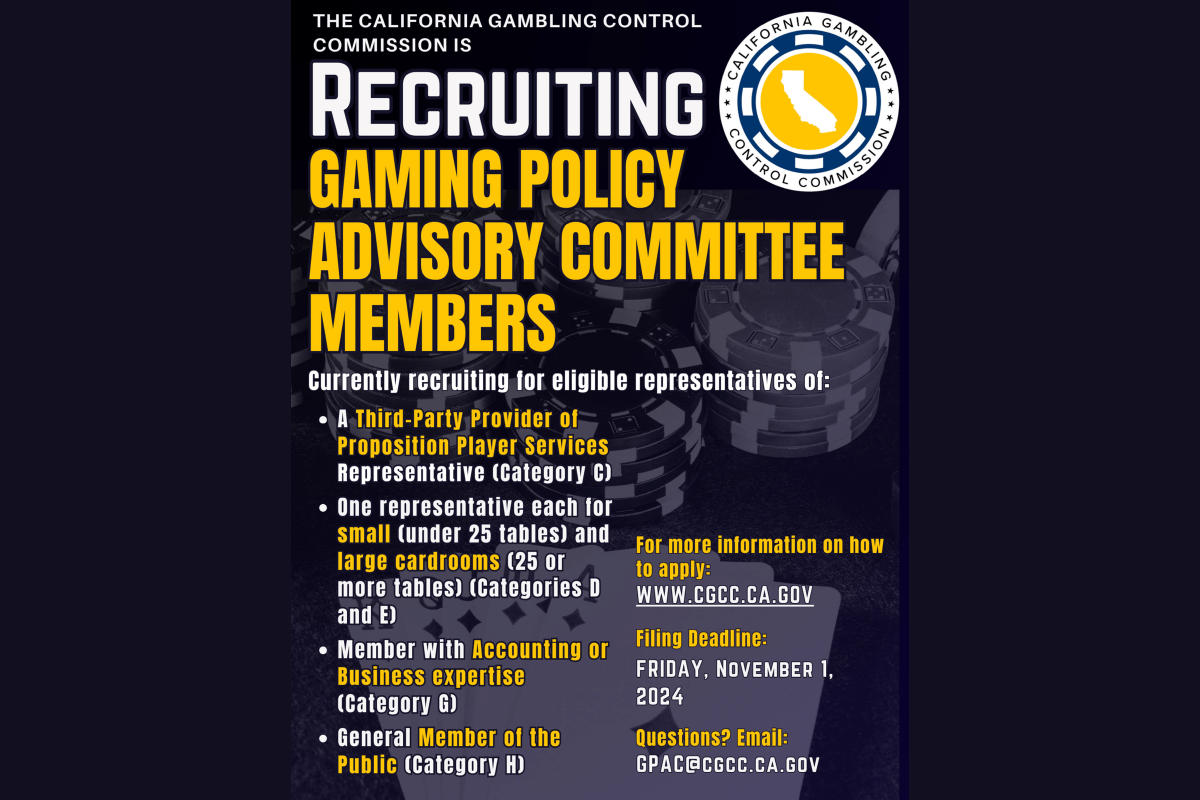
The Gaming Policy Advisory Committee (GPAC) is a ten-member committee established pursuant to Business and Professions Code section 19817 to provide advisory recommendations to the California Gambling Control Commission (Commission). Its membership, as appointed by the Commission, includes equal part appointments from the public as well as the cardroom industry.
The GPAC has the following five highlighted seats that have a term limit ending on December 31, 2024.
PUBLIC REPRESENTATIVES:
Category A: An employee from the Bureau of Gambling Control (BGC), Department of Justice (1 seat)
Category B: A representative from an agency or nonprofit concerned with problem gambling and/or gambling addiction (1 seat)
Category F: A representative affiliated with local law enforcement from a local government where an approved ordinance allows legalized gaming (1 seat)
Category G: A professional with an accounting or business background and not currently affiliated with a California legalized gambling entity (1 seat)
Category H: A general member-at-large not currently affiliated with any California legalized gambling entity (1 seat)
INDUSTRY REPRESENTATIVES:
Category C: A licensee, agent, or employee from a Third-Party Provider of Proposition Player Services (1 seat)
Category D: A licensee, agent, or employee from an actively licensed cardroom with 25 tables or more in operation (2 seats; 1 seat vacant ¹)
Category E: A licensee, agent, or employee from an actively licensed cardroom with less than 25 tables in operation (2 seats; 1 seat vacant)
The Commission is currently accepting applications through November 1, 2024, from all eligible applicants for the GPAC seats in the following categories: C, D1, E1, G¹ and H.
The GPAC Application and Selection Process can be found on the Commission’s website at www.cgcc.ca.gov. Applications should be submitted electronically to [email protected]. Interviews will be scheduled shortly after the application deadline (mid-November).
GPAC’s mission is:
The Commission is currently accepting applications through November 1, 2024, from all eligible applicants for the GPAC seats in the following categories: C, D1, E1, G¹ and H.
The GPAC Application and Selection Process can be found on the Commission’s website at www.cgcc.ca.gov. Applications should be submitted electronically to [email protected]. Interviews will be scheduled shortly after the application deadline (mid-November).
GPAC’s mission is:
“Provide advisory recommendations to the California Gambling Control Commission concerning matters of controlled gaming regulatory policy and other relevant gambling related issues, with special attention to guaranteeing the integrity of gambling operations and to deal effectively with problem gambling.”
The GPAC currently meets every eight weeks. GPAC meetings will be held via Zoom through the end of 2025 whereupon meetings will have to be a combination of in person and via Zoom. Audio recordings of previous meetings can be found on the Commission’s website.
The GPAC is an asset when addressing matters of importance for the cardroom industry. GET INVOLVED, whether through attending the GPAC’s public meetings, submitting an application for consideration of appointment to the GPAC, or by simply sending in comments for the GPAC’s consideration and discussion via the email address below.
“Provide advisory recommendations to the California Gambling Control Commission concerning matters of controlled gaming regulatory policy and other relevant gambling related issues, with special attention to guaranteeing the integrity of gambling operations and to deal effectively with problem gambling.”
The GPAC currently meets every eight weeks. GPAC meetings will be held via Zoom through the end of 2025 whereupon meetings will have to be a combination of in person and via Zoom. Audio recordings of previous meetings can be found on the Commission’s website.
The GPAC is an asset when addressing matters of importance for the cardroom industry.
Compliance Updates
GiG grows regulated market footprint with new B2B supplier authorisation for Peru
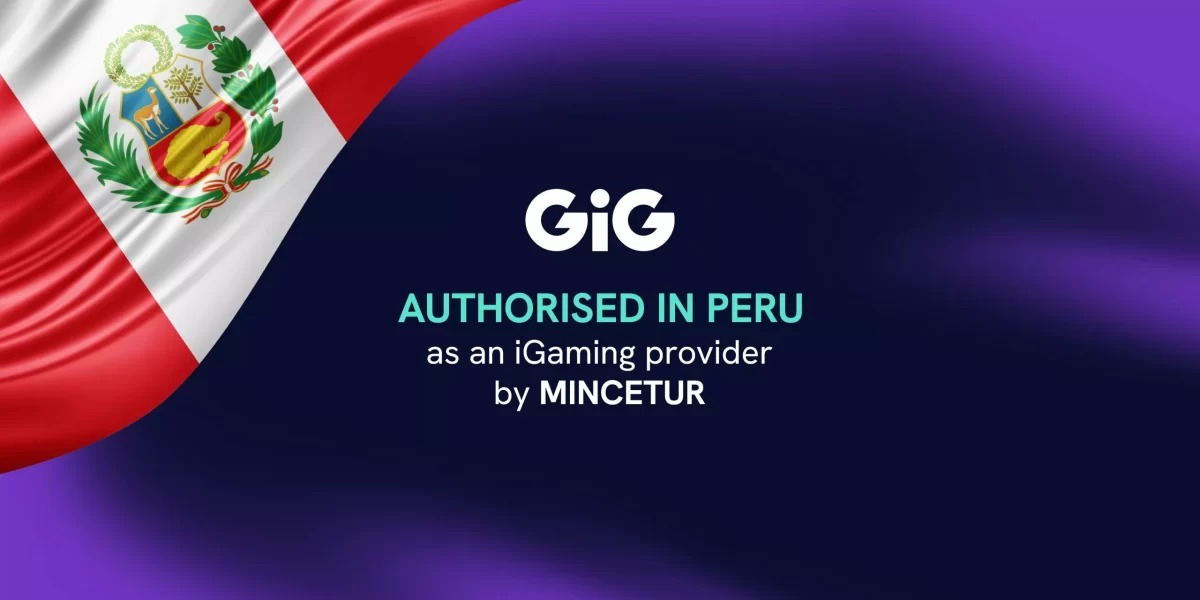
Gaming Innovation Group (GiG) has been awarded an authorisation and registration (homologation) for Peru, officially allowing it to partner with operators based in the newly regulated Latin American market, as GiG continues to grow its regulated market presence with over 29 complex regulated markets now available globally, on its revolutionary iGaming technology.
The accreditation process, which opened its doors earlier this year, marks an early entry for GiG that will allow it to serve a market expected to grow post regulation by up to 104%, up from €194m to €397m, in gross gaming revenue (GGR) over the next three years, according to H2 Gambling Data.
This new authorisation from the Peruvian authority, granted to GiG by Ministerio de Comercio Exterior y Turismo de Perú (MINCETUR) , and covers its award winning PAM, as GiG continues a long-standing commitment to regulated market expansion, reaffirming’s its position as a global leader for growth in highly regulated markets.
GiG’s Peruvian presence gained prominence with the announcement of the launch of Betsson Group’s Inkabet brand, in July, expanding on the successful partnership between the two, in regulated markets around the world.
GiG is continuing to expand its presence in global regulated markets, and across Latin America, with its innovative iGaming platform, as its powerful, secure, and scalable platform offers operators significant opportunities for exponential revenue growth, with a suite of dynamic localisation features. Peruvian operators will benefit from GiG’s integration with leading content and payment providers, with advanced AI tools, DataX and LogicX, enhancing decision-making and rule-building processes. This balance of cutting-edge tools and best-in-class features have proven highly effective in increasing player acquisition and retention, highlighting GiG’s competitive edge in complex regulatory environments like Peru.
Claudio Caruana, General Counsel for GiG says; “The addition of the Peruvian authorisation to our ever expanding list of supported regulated markets continues to demonstrate the focus we at GiG have placed on legislation, providing the framework essential for sustainable and prosperous growth within the online igaming industry. We are delighted to be fully prepared to power new and potential partners with our award winning technology in the area.”
-

 Interviews7 days ago
Interviews7 days agoAxel Antillon: Our Peru entry is a major milestone for WA.Technology
-

 Compliance Updates6 days ago
Compliance Updates6 days agoGiG grows regulated market footprint with new B2B supplier authorisation for Peru
-

 Latest News5 days ago
Latest News5 days agoHarrah’s Cherokee Valley River’s New Hotel Tower Nears Completion
-

 Latest News6 days ago
Latest News6 days agoPatrick Homm to Lead Scientific Games International Lottery Systems Technology
-

 Latest News6 days ago
Latest News6 days agoLottery Courier Jackpot.com Launches Digital “Scratchers”
-
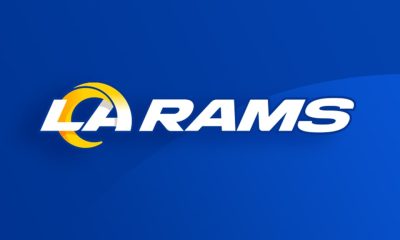
 Latest News2 days ago
Latest News2 days agoLos Angeles Rams launch Next Gen Stats-powered, in-stadium highlights through new collaboration with Genius Sports
-

 Latest News6 days ago
Latest News6 days agoDiffusionData Appoints Raphael Vergnaud as CRO
-

 Press Releases6 days ago
Press Releases6 days agoSpintec Introduces a Host of New Products at G2E






